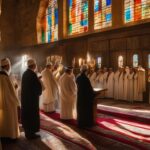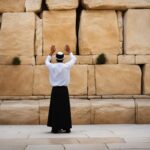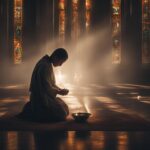In Jewish traditions, candles hold deep symbolism and are believed to represent the human soul. From Shabbat to Yom Kippur, candles play a significant role in Jewish practices and rituals. Lighting a yahrzeit candle on Yom Kippur is a way to honor the memory of loved ones and strengthen the divine connection.
Yom Kippur, also known as the Day of Atonement, is a solemn occasion filled with fasting, prayer, and repentance. It is a time for self-reflection and seeking forgiveness from both God and those we have wronged. As part of this spiritual observance, the lighting of the yahrzeit candle holds special significance.
Key Takeaways:
- The yahrzeit candle is a symbolic representation of the human soul in Judaism.
- Lighting the yahrzeit candle on Yom Kippur is a way to honor the memory of loved ones.
- Yom Kippur is a day of atonement and seeking forgiveness in the Jewish tradition.
- Candles hold deep symbolism and play a significant role in Jewish practices and rituals.
- Prayer lighting the yahrzeit candle strengthens the divine connection during Yom Kippur.
The Significance of Candles in Jewish Practices
In Judaism, candles hold deep symbolism and play an integral role in various practices and rituals. They are believed to represent the human soul and serve as a conduit for divine light. According to Rabbi Geoffrey W. Dennis, candles accompany individuals throughout their lives, symbolizing the spiritual light within oneself.
“Candles have a unique ability to invite the divine presence, creating an atmosphere of holiness. Lighting candles during Shabbat, in particular, signifies the transition from the mundane to the sacred,”
says Rabbi Dennis.
Shabbat candles are traditionally lit on Friday evenings to welcome the Sabbath and mark the beginning of a day of rest and worship. The lighting of these candles represents the invitation of the divine presence into the home and the kindling of the spiritual light within each individual. Different types of candles can be used, such as oil and wick candles, tea lights, or tall tapers, depending on personal preference and tradition.
The Symbolic Importance of Shabbat Candles
The lighting of Shabbat candles serves as a symbolic act of sanctification, transforming an ordinary space into a sacred environment. The soft, flickering light represents the spiritual presence, bringing warmth, peace, and tranquility to the home. It is customary for women to fulfill the mitzvah of lighting the Shabbat candles, typically lighting two candles to represent the dual commandments of Zachor (remember) and Shamor (observe).
| Candle Type | Symbolism |
|---|---|
| Oil and Wick Candles | Traditionally used in Jewish rituals, they symbolize the eternal light of the soul. |
| Tea Lights | Provide a convenient and portable option for lighting candles in various spaces. |
| Tall Tapers | Often used for special occasions and ceremonies, they add an elegant touch to the ambiance. |
The act of lighting Shabbat candles creates a sacred space, allowing individuals to connect with their spirituality and find solace in the divine presence. The flickering flame serves as a reminder of the warmth and light within each person, as well as the potential to spread that light to others.
As candles hold deep symbolism in Jewish practices, they continue to play a significant role in individual and communal observance, bringing light, peace, and spiritual connection to those who kindle them.
Lighting Candles on Yom Kippur
On Yom Kippur, the Day of Atonement, the act of lighting candles holds special significance in Jewish observance. In some communities, a practice known as soul candles or ner neshama takes place during this solemn occasion. These candles are made from blessed thread and are lit not only to commemorate the deceased but also to pray for healing and show mourning. The Yahrzeit, or Yizkor, candle is also lit on Yom Kippur to honor the memory of loved ones and can burn for 26 hours.
The lighting of these candles serves as a powerful reminder of the connection between the living and the departed. It symbolizes the continuation of the soul’s journey and the enduring presence of loved ones in our lives. As the candles flicker, they represent the eternal light of the human spirit and serve as a beacon of hope and remembrance.
During Yom Kippur, the lighting of candles is intertwined with prayers of repentance and forgiveness. It is a deeply personal and introspective time, where individuals reflect on their actions and seek spiritual purification. The act of lighting the Yahrzeit and soul candles becomes a profound expression of devotion and remembrance, allowing individuals to honor their loved ones’ memories while seeking forgiveness and atonement for themselves.
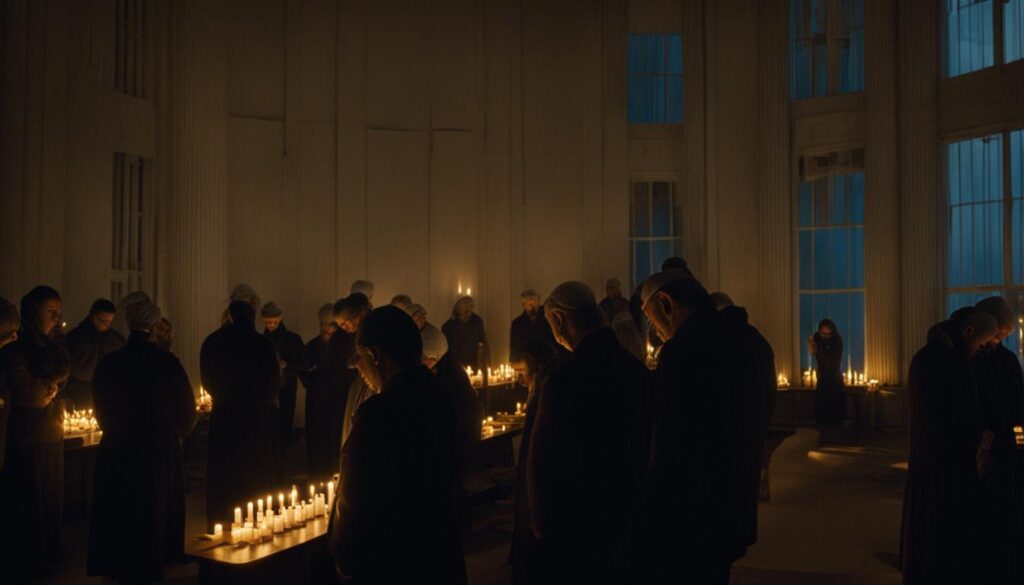
Yizkor: A Time for Reflection and Remembrance
In addition to lighting candles, Yom Kippur is also a time when the Yizkor memorial prayer is recited. Yizkor, which means “remembrance” in Hebrew, is a solemn moment to honor and commemorate loved ones who have passed away. It is a time for reflection, as individuals remember the impact their loved ones had on their lives and the lasting legacy they leave behind.
During the Yizkor service, prayers and psalms are recited, and individuals have the opportunity to make charitable contributions in memory of their loved ones. This act of giving is not only a way to honor their memory but also to bring comfort and support to others in need.
Yom Kippur, with its candle lighting rituals and Yizkor prayer, provides a time of deep spiritual reflection and remembrance. Through these practices, individuals can find solace, seek forgiveness, and strengthen their connection to both the divine and their loved ones.
Observing Yahrzeit and Yizkor
Yahrzeit is an important observance in Judaism that commemorates the anniversary of a loved one’s passing according to the Hebrew calendar. It serves as a personal remembrance and an opportunity to honor the memory of the deceased. Many families choose to light a yahrzeit candle during this time to symbolize the eternal flame of their loved one’s soul. This act of lighting the candle is a way to keep their memory alive and honor their presence in their lives.
Yizkor, meaning “remembrance” in Hebrew, is a memorial prayer service that takes place four times a year. It is a time for individuals to come together and honor the memory of their loved ones. During Yizkor, prayers are recited, and there is a commitment to perform acts of charity in memory of the departed. This tradition of remembering and commemorating loved ones is deeply rooted in Jewish culture and provides a sense of comfort and connection to those who have passed.
When observing Yahrzeit and Yizkor, it is common for families to engage in various rituals and practices. Some families may choose to visit the grave of their loved one, recite special prayers, or participate in acts of loving-kindness in their memory. These acts serve as a way to honor their memory and continue their legacy.
Table: Significant Dates for Yahrzeit Observance
| Hebrew Month | English Month | Yahrzeit Date |
|---|---|---|
| Nisan | March/April | 1 |
| Tishrei | September/October | 10 |
| Shevat | January/February | 15 |
| Tammuz | June/July | 1 |
Yahrzeit is observed on specific dates according to the Hebrew calendar, which may differ from the corresponding English month. These dates are significant as they mark the anniversaries of the loved one’s passing. Families often mark these dates by lighting a yahrzeit candle and reciting the Mourner’s Kaddish, a prayer that praises and sanctifies God’s name. The act of observing Yahrzeit not only allows families to remember and honor their loved ones, but it also provides an opportunity for reflection and connection to their spiritual roots.
As Yahrzeit and Yizkor hold deep meaning in Jewish tradition, individuals find solace and strength in the remembrance of their loved ones. These observances serve as a reminder of the cycles of life and the everlasting impact of those who have passed. Through these rituals and prayers, families are able to connect with their heritage, find comfort in community, and honor the memories of their loved ones for generations to come.
The Significance of Yom Kippur: A Day of Atonement and Reflection
Yom Kippur, also known as the Day of Atonement, holds great importance in the Jewish calendar. It is a day of fasting, prayer, repentance, and seeking forgiveness. On this solemn occasion, individuals reflect on their actions of the past year, seeking to make amends and start anew. The rituals and observances of Yom Kippur create a space for spiritual introspection and growth.
Fasting is a central aspect of Yom Kippur, symbolizing the commitment to self-discipline and spiritual purification. From sundown to sundown, individuals abstain from food and drink, focusing their thoughts on repentance and atonement. This act of self-denial serves as a reminder of the importance of humility and the recognition of one’s own faults.
Prayer is another integral part of Yom Kippur. The day is filled with communal prayer services, including the recitation of special prayers like Kol Nidrei and Viduy (confession). Through prayer, individuals seek forgiveness not only from God but also from those they have wronged. It is a time to reflect on one’s actions, ask for forgiveness, and strive for reconciliation.
Repentance and forgiveness are the underlying themes of Yom Kippur. It is a time for individuals to examine their behavior, acknowledge their shortcomings, and commit to making positive changes. By seeking forgiveness from both God and others, individuals aim to repair relationships, reconcile differences, and foster a sense of unity within the community.
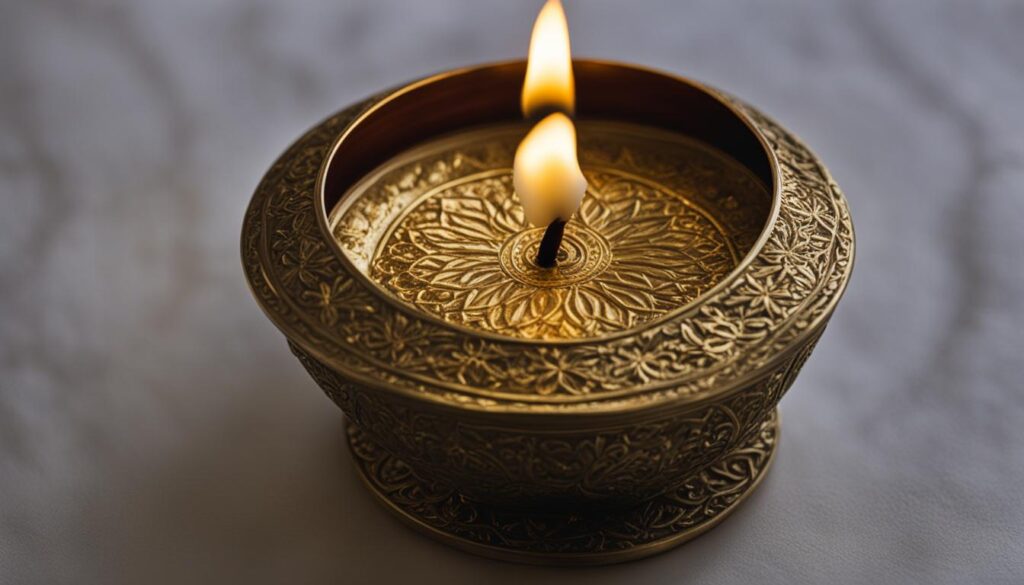
In conclusion, Yom Kippur is a sacred day in the Jewish faith, offering an opportunity for introspection, repentance, and forgiveness. Through fasting, prayer, and reflection, individuals strive to atone for their mistakes, seek forgiveness, and begin the new year with a renewed spiritual connection. The significance of Yom Kippur extends beyond personal redemption, emphasizing the importance of community, reconciliation, and growth.
Incorporating Yahrzeit and Yizkor into Funeral Services
Funeral traditions hold great importance in many cultures and religions, providing a way for loved ones to honor and remember the deceased. In Jewish funeral services, incorporating the observances of Yahrzeit and Yizkor can bring added depth and meaning to the ceremony. Funeral directors play a vital role in supporting families during this challenging time and can provide guidance on how to include these remembrance rituals.
Yahrzeit, which is observed one year after the passing of a loved one, allows families to memorialize their loss according to the Hebrew calendar. Lighting a Yahrzeit candle during the funeral service or including a special moment of remembrance can help honor the memory of the deceased. Additionally, funeral programs can be customized to include information about Yahrzeit and the significance of lighting the candle each year on the anniversary of the passing.
Another important observance is Yizkor, which refers to the memorial prayer service held four times a year. Funeral directors can assist families in incorporating this meaningful prayer into the funeral service, allowing for a collective moment of remembrance. Including a quote or passage from the Yizkor prayer in the funeral program or obituary can also provide solace and connection to the broader Jewish community.
| Funeral Traditions | Remembrance Rituals | Funeral Programs | Obituaries |
|---|---|---|---|
| Jewish funeral services | Yahrzeit and Yizkor | Customization and inclusion | Quotes and passages |
| Supporting families | Memorializing loved ones | Information and guidance | Solace and connection |
Understanding the significance of Yahrzeit and Yizkor in Jewish funeral traditions allows funeral directors to provide meaningful support to grieving families. By incorporating these remembrance rituals into funeral services, programs, and obituaries, funeral directors can honor the memory of the deceased and bring comfort to those in mourning. The inclusion of Yahrzeit and Yizkor not only pays tribute to the loved one but also strengthens the bonds of community and tradition.
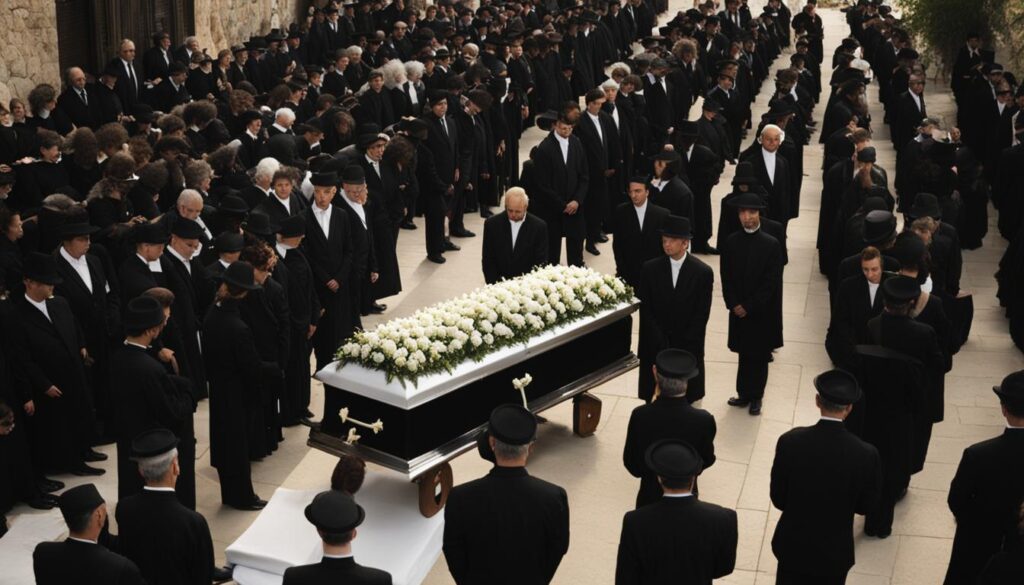
Conclusion
Prayer lighting yahrzeit candles on Yom Kippur is a deeply meaningful practice that holds a special place within Jewish traditions. It serves as a powerful way to remember and honor loved ones, while also strengthening the divine connection. This observance is an opportunity for individuals to seek forgiveness, atonement, and spiritual renewal.
By incorporating the lighting of yahrzeit candles into Yom Kippur observance, Jewish communities are able to embrace a sense of remembrance and reflection. This act of prayer lighting serves as a symbolic reminder of the eternal light that resides within each individual’s soul.
Throughout history, Jewish remembrance has been a cornerstone of the faith, ensuring that the lives and legacies of those who have passed away are never forgotten. By continuing the tradition of prayer lighting yahrzeit candles on Yom Kippur, Jewish individuals can forge a deeper connection to their heritage and find solace in communal remembrance.
FAQ
What do candles symbolize in Judaism?
Candles in Judaism symbolize the human soul and the divine presence.
What is the significance of lighting candles on Shabbat?
Lighting candles on Shabbat invites the divine presence and represents the spiritual light within oneself.
What types of candles can be used in Jewish practices?
Different types of candles, such as oil and wick candles, tea lights, or tall tapers, can be used.
What is the practice of soul candles on Yom Kippur?
Soul candles, or ner neshama, are made from blessed thread and are lit to commemorate the deceased, pray for healing, and show mourning.
What is a Yahrzeit candle?
A Yahrzeit candle is lit on Yom Kippur to honor the memory of loved ones and can burn for 26 hours.
When is Yahrzeit observed?
Yahrzeit is observed one year after the death of a loved one according to the Hebrew calendar.
What is Yizkor?
Yizkor refers to memorial prayer services held four times a year to honor and commemorate loved ones.
What is the significance of Yom Kippur?
Yom Kippur is a solemn day of repentance and atonement, observed through fasting, prayer, and seeking forgiveness.
How can funeral directors support families in observing Yahrzeit and Yizkor?
Funeral directors can provide support and guidance in incorporating Yahrzeit and Yizkor into funeral services, programs, and obituaries.
What does prayer lighting Yahrzeit candles on Yom Kippur symbolize?
Prayer lighting Yahrzeit candles on Yom Kippur symbolizes remembrance, honoring loved ones, strengthening the divine connection, and seeking forgiveness and atonement.




